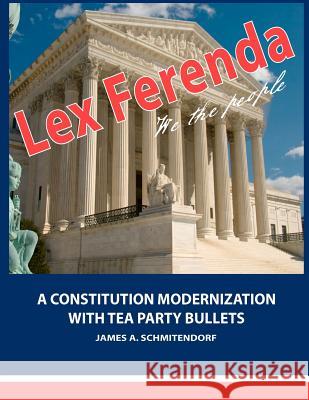Lex Ferenda: A Constitution Modernization with Tea Party Bullets » książka
Lex Ferenda: A Constitution Modernization with Tea Party Bullets
ISBN-13: 9780983934905 / Angielski / Miękka / 2011 / 194 str.
This book concerns the Constitution of the United States and how it might be improved. It primarily covers law and political science topics, but supporting information necessitates some inclusion of related finance and economic subjects. The first chapter gives the early history of the Constitution and then reviews the works of eight authors who wrote books about needed revisions. The basic U.S. Constitution is annotated for areas of deletion of obsolete phrases and inclusion of present amendments and folded into the current document without meaning changes. The Constitution contains several items that applied in the late 18th century but are not applicable today. These items are updated to the 21st century with appropriate language. Some basic changes have been shown by modern polls to be favored by a significant majority of our citizens. The pros and cons of seven of these items are discussed, justified and reduced to constitutional language. These revisions are then incorporated into the Constitution. Recent history and the 2008-2011 financial crisis have called attention to the possibility that organizations, including the government and unions, are too large. Chapter 5 supplies language to solve this problem. This controversial chapter also gives an extended discussion of antitrust law and financial economics. Chapter 6: Solutions of the Elite: A book by John Vile, Rewriting the U.S. Constitution, 1991, brought together some 40 different authors' ideas about Constitution improvement. This chapter analyzes the results but refrains from suggesting constitutional language or inclusion of topics not already covered in chapter 4 and thereby leaving ample work for a convention. No other knowable book attempts a scheme to organize and manage an unbiased Constitution convention. There are seven appendices providing extensive background information. Appendix 4 is of particular interest giving over 300 topic ideas (Tea Party Bullets) for a convention. The author spent over ten years studying and gathering reference material for this project. It has taken this long to do the subject justice. The project was started because President Clinton lied under oath without repercussions from an allowing Senate and because the federal government was out of fiscal control. I later discovered most of the Framers/Founders were Revolutionary War veterans providing additional rationale and enthusiasm for my authorship. There has been no work similar to this since 1938 when Charles H. Coleman wrote an article for the National Council for the Social Studies. Nearly all other authors make only suggestions for Constitution changes without specific language and usually in hopes a convention would provide that aspect of the job. This is also the only book to review in depth the basic subject in some time. Another important aspect of the work is its contemporary status. Hardly a day goes by without some news pundit or politician mentioning the need to change the Constitution, usually to endorse a balanced budget Constitution Amendment. Such topics are addressed in both Chapter 4 and 5 and are sure to be prevalent in future elections. Considerable attention is given to the Supreme Court since its rulings have a profound impact on constitutional law. Three of the appendices are devoted to this subject. Other appendices cover culture changes, economics, antitrust law and numerous convention possible one-liners called Tea Party Bullets. Although not designed as a textbook, Lex Ferenda could certainly be used for a seminar or as required reading in a political science or constitutional law course.











